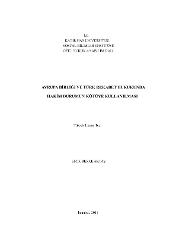| dc.contributor.advisor | Memiş, Tekin | en_US |
| dc.contributor.author | Aktas, Emir Berke | |
| dc.date.accessioned | 2019-07-12T08:37:22Z | en_US |
| dc.date.available | 2019-07-12T08:37:22Z | en_US |
| dc.date.issued | 2011 | en_US |
| dc.identifier.uri | https://hdl.handle.net/20.500.12469/2136 | |
| dc.description.abstract | Son yillarda ulkelerin kapali ekonomi anlayisini terk ederek benimsemis olduklari liberal politikalar neticesinde uluslararasi ticaret hacminde ciddi anlamda buyumeler yasanmis ve bunun neticesinde piyasalar icerisindeki rekabet ortamini duzenleyecek kurallara duyulan ihtiyac artmistir. ulkemizde temelini Avrupa Birligi rekabet hukuku kurallarindan dayanagini ise Anayasa'dan alan Rekabetin Korunmasi Hakkinda Kanun 1994 yilinda hukum altina alinmistir. Rekabetin Korunmasi Hakkinda Kanun 3 temel sutun uzerine insa edilmistir. Bunlarin ilki tesebbusler arasi rekabeti engellemeye veya kisitlamaya yonelik anlasmalar ile uyumlu eylemlerin yasaklanmasi ikincisi hakim durum yaratmaya yonelik birlesme ve devralmalarin denetlenmesi ucuncusu ise konumuzun temelini teskil eden hakim durumun kotuye kullanilmasinin yasaklanmasidir. | en_US |
| dc.description.abstract | In recent years, countries have adopted liberal policies by abandoning the closed economy concept. Consequently, international trade has grown and the need for competition rules has increased. Law No. 4054 Protection of the Competition which takes its support from the constitution prohibits agreements, decisions and concerted practices which prevent, distort or restrict competition, abuse of dominant position by the enterprises which are dominant in market, and all kind of operations and practices about merger and acquisition which decreases competition in market.Abuse of dominant position refers, the abuse by one or more undertakings, of their dominant position in a market for goods or services within the whole or a part of the country on their own or through agreements with others or through concerted practices. Whereas the prevention of abuse of dominant position is ensured in our country by the sixth article in the Protection of Competition, it is ensured by the one-hundred-and-second article in the Treaty of the Functioning of EU under the European Union regulations. This abuses are classified as an exploitative abuses and exclusionary abuses. While the exploitative abuse makes negative effects on consumer and competitor interests, exclusionary abuse makes negative impacts on the markets.In our study, this two article was examined in the light of the decisions of Court of Justice, Competition Board and the Commission. Despite the literal differences between the articles, it is observed that both the Turkish and the European Union competition law rules serve a common purpose and prohibit the same applications. Abuse of dominant position causes similar results in both legal systems in the field of administrative law and private law. The Commission and Competition Board has the power to terminate the infringement and imposing fines. Private law consequences of abuse of dominant position are nullity and compensation. | en_US |
| dc.language.iso | tur | en_US |
| dc.publisher | Kadir Has Üniversitesi | en_US |
| dc.rights | info:eu-repo/semantics/openAccess | en_US |
| dc.subject | N/A | en_US |
| dc.title | Avrupa birligi ve Turk rekabet hukukunda hakim durumun kotuye kullanilmasi | en_US |
| dc.type | masterThesis | en_US |
| dc.department | Enstitüler, Lisansüstü Eğitim Enstitüsü, Özel Hukuk Ana Bilim Dalı | en_US |
| dc.relation.publicationcategory | Tez | en_US |
| dc.identifier.yoktezid | 294695 | en_US |
















